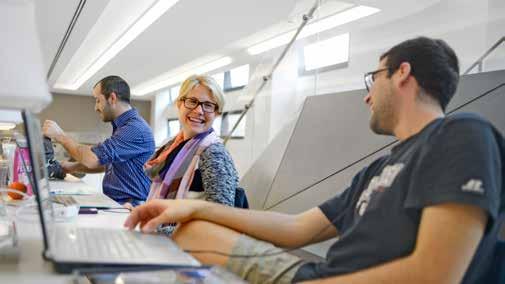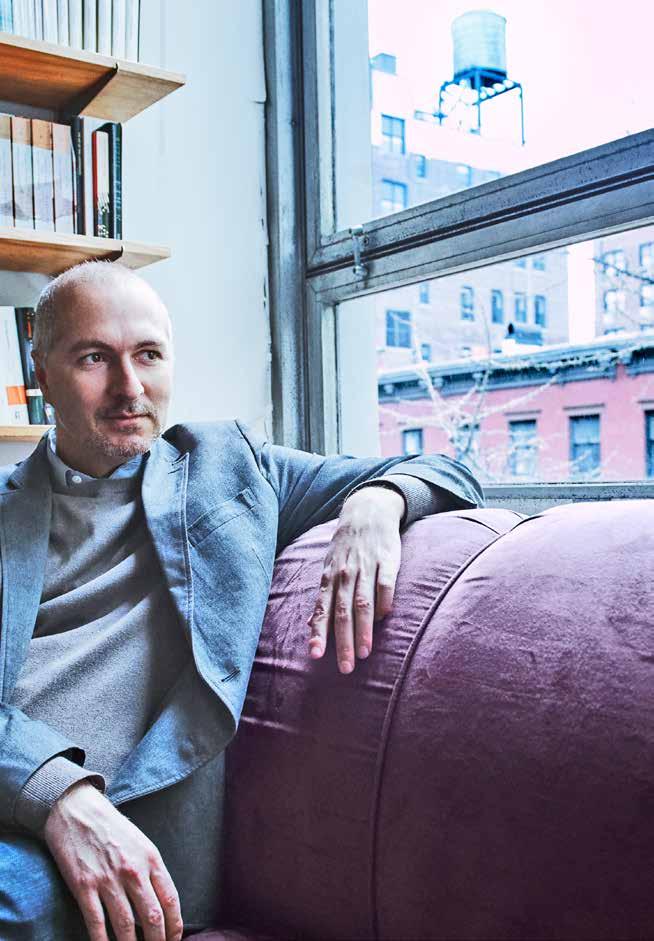
8 minute read
Liberal Studies
from 2020 NSSR Viewbook
I. OVERVIEW


II. DIALOGUE


Liberal Studies Overview
Design your own interdisciplinary curriculum. The Committee on Liberal Studies brings together students interested in research and writing in the humanities and social sciences. In conjunction with a faculty advisor, students can choose courses that cover historical and contemporary philosophy, intellectual history, literature, the arts, media, critical theory, publishing, and writing. With only two required courses, Liberal Studies gives students the freedom to design a curriculum that best meets their academic interests and career goals.
The program is designed for selfdirected students who want to improve the quality of their prose while mastering new modes of serious inquiry, either within an academic context or with the goal of engagement in the wider public sphere. Special attention is paid to the history of Western thought, but courses also explore current developments in global culture(s) and contemporary critical theory.
A significant percentage of students seek to build a strong and broad intellectual base before choosing a PhD program in a humanities or social science discipline, whether at The New School for Social Research or elsewhere. Some develop careers in writing, journalism, or publishing; some aim for professions that benefit from a broad knowledge base, such as law, business, curatorial practice, or work with nonprofits. Others simply want a richer engagement with the culture of our times—and times past—independent of any particular professional goal.
Students will encounter faculty engaged in critical media theory, like Dominic Pettman, Eugene Thacker, and McKenzie Wark, as well as distinguished journalists and creative writers, including Jed Perl, art critic with the New Republic, and Robert Boyers, editor of the literary quarterly Salmagundi.
Degrees Offered
The Liberal Studies program offers the MA degree. Students who fulfill MA requirements in one of the six PhD-granting departments in the course of completing the MA in Liberal Studies may petition for admission to PhD study in that department.
Below are some recent master’s thesis titles that reflect student creativity and interests.
Futurism, Fascism, and Henri Bergson’s Philosophy of Time The Aura of the Brand: Nike and Postmodern Capitalism Camp Aesthetics in Andy Warhol Biblical Allusions in Nietzsche’s Thus Spake Zarathustra The Pinochet Case: Universal Jurisdiction and State Sovereignty The Concept of Self-Government in Jefferson Davis and Abraham Lincoln Franz Kafka and Hannah Arendt’s Image of Totalitarianism
Recent Courses
Aesthetics: Literature and Arts Labor and Dignity Trans Theory and Gender Theory American Dialectics: Art in New York After 1945 Thinking Technology Studies in Radical Aesthetics: The Ideas and Practice of Political Theater
Recent Outcomes
Katalin van Harreveld (MA ’18): Researcher and Producer, Radiolab Ginger Dellenbaugh (MA ’17): Doctoral Student, Yale University Laina Dawes (MA ’16): Doctoral Student, Columbia University Sonia Qadir (MA ’16): Legal Advisor, Punjab Commission on the Status of Women

Research Without Boundaries
Dominic Pettman Professor of Culture and Media
When you staff a program with professors from every discipline at The New School for Social Research, rigorous interdisciplinary scholarship is bound to follow. In fact, it confronts you at every turn. As professor of culture and media, Dominic Pettman helps students contextualize the intellectual history of ideas and social thought through a theoretical framework that doesn’t confine those ideas to any particular field or area of study. This approach to teaching completely suits Pettman, an academic who has studied a number of methods and disciplines in the humanities and social sciences. He notes that this approach gives students “who refuse to choose” the ability to decide on an academic direction while also participating in intense intellectual inquiry.
With a background in literary theory, philosophy, media theory, and cultural studies, Pettman tackles big questions— What is the human? What is the relationship of the human to technology? What is love? What is beauty? What is power?—and the way those questions are inflected through specific media like books, films, and video games. His latest work asks the metaphysical and political question of what deserves to have a voice, ultimately arguing that society should broaden the population of entities that can have this all-important opportunity. Pettman has also started to research and write about libidinal ecology—the link between sex and the environment—and aims to answer the question, What is the carbon footprint of your libido? He, like the rest of the faculty in the program, continually tries to invent new concepts and produce new models to contribute to the next chapter in the ceaselessly unfolding history of ideas.
Although the department lacks traditional boundaries, Pettman cautions people not to think of Liberal Studies as a chaotic free-for-all for unfocused students. Rather, he says, it is for motivated students who want a second or third way to research mindfully and rigorously. Students need to be self-directed, but they always have the support and guidance of faculty to help them forge their own path, think clearly about topics, and produce exceptional writing. Pettman describes Liberal Studies as a “boutique program” in which students are matched with faculty and advisors to provide the most rewarding tailored experience possible.
Paul Kottman Discusses Questions Only the Humanities Can Answer


Paul Kottman Associate Professor of Literary Studies
[00:00:00] Interviewer: What led you to the themes explored in your latest book, Love As Human Freedom (Stanford University Press, 2017), in which you examine the ways romantic love expresses human experience?
[00:00:15] Paul Kottman: While teaching a summer course in Verona, every day I would walk past the balcony that Shakespeare’s tragic lover Juliet allegedly used. What interested me was its grasp on the tourist imagination, the number of visitors from parts of the world that don’t, so to speak, have the same myth of romantic love as the Shakespearean version. It was the quasiuniversal appeal of the Romeo and Juliet story that got me thinking. Instead of trying to figure out what love is—a fool’s errand—I began by asking, “What does love make sense of?”
This question sits alongside the social practices Hegel describes as the most fundamental ways humans across cultures explain themselves to themselves: art, religion, and philosophy. I wondered what it would mean to add sexual love to the list, as a historically shifting, trans-historical way of making sense of human life and the claims of nature. That’s how the book got started. I think there are questions in the humanities for which the mastery of a particular subject matter is necessary but not sufficient to respond. In that sense, it’s not a discipline-based book, although I put a lot of disciplinary work into it. [00:02:48] IN: The Internet has made it possible for researchers like you to explore fields outside of their own. How do scholars contend with the vast amount of data available for research?
[00:03:12] PK: In the information-saturated world we live in, there is a tendency to substitute information for knowledge, to think that “if I’m informed, I’m no longer ignorant.” But there is a difference between being informed and knowing, or understanding, something. I can, for example, be informed that there was once such a thing as human sacrifice in various ancient cultures. But that doesn’t answer the questions, What is human sacrifice, actually? What kind of value does it express? Those questions can’t be answered by more information—collecting data doesn’t answer the fundamental questions. What the human sciences, the humanities, can do is foreground that first question: What is a cultural product or social practice, anyway?
[00:04:43] IN: Is that perspective typical of Liberal Studies at The New School?
[00:04:57] PK: My colleagues and I at Liberal Studies realize that there are important questions to study in a sustained way that aren’t necessarily addressable within a more narrow disciplinary context—questions such as, What is living a free life, and why does it matter? and, When is the coercive violence of the state legitimate?
Even classical “political science” questions seem not always to have straightforward, discipline-based answers. What I sometimes call “meaning and value” questions—What do we care about, and why? How do different forms of meaning work, and what do they require of us as interpreters?—are to some extent addressed in the study of literature, film, and so forth. But often the questions overlap fields, not just interdisciplinarily but transdisciplinarily. I think of our program as experimentally working out a set of programmatic answers to these questions at the curricular level.
[00:07:14] IN: What would you say to a prospective student about the Liberal Studies community?
[00:07:31] PK: The virtue of The New School is that the conversation is at a very high level. The kind of “gentlemanly distance” that often characterizes official discussions at some universities—where there’s a hesitance to have a public conversation— doesn’t exist at NSSR. Real conversation is crucial for intellectual life. And I think that students at NSSR find it exhilarating that we actually do talk to one another in seminars and workshops and as faculty. That doesn’t happen everywhere. Also, the international character of The New School is a huge benefit. It’s much harder to retreat into a parochial, limited worldview when you’re confronted on a daily basis with people whose formations are different and who have different questions, backgrounds, and formative texts which they’ve read.
[00:10:02] IN: In what ways do you want liberal studies scholars at NSSR to be daring in their research?
[00:10:27] PK: One of the hardest things for us all is to figure out how to cut through ideological truisms—whatever those might be—in ways that get us to rethink things and ask what they really are, or what they mean. That’s hard to do. But it’s made easier when done collectively. What I always hope for from students, and I imagine they hope for it from me, is that we achieve that conversation together.









